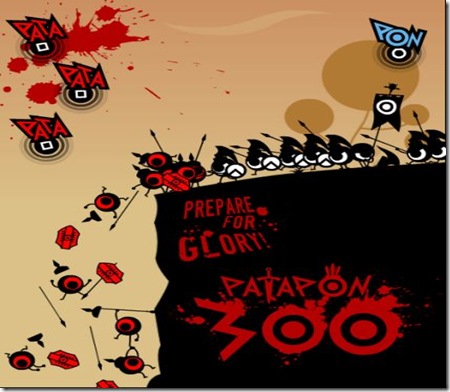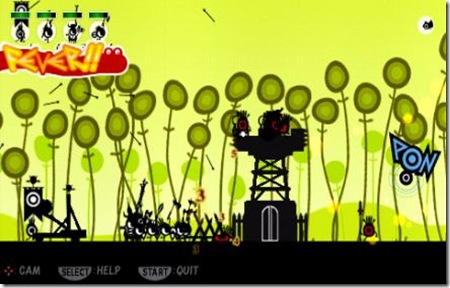Patapons, Zigotons, and Everything In-Between
The other day, I went out to lunch with my mother in penance for being such an absentee son. After waxing ridiculous about IHOP’s Horton Hears a Who cross-promotion (pancakes that secrete pink and blue something, and Sprite mixed with insoluble hard candies), I attempted to explain Patapon, a game on the PSP, to my mom. Understand that, under normal circumstances, I wouldn’t have even given thought to such a feeble gesture, but having only just discovered Patapon’s joys mere minutes earlier, I was determined to spread the word.
As you probably expected, the end result was disastrous. She thought the game’s concept sounded weird and lame, and I was sadly without disciples for my Pataponian movement. Well, having invested a little more time in the game, I’ve now realized that, contrary to the results of my lunchtime escapade, Patapon is an excellent title for those hard of gaming. At the same time, however, it’s unfortunately incapable of reaching many of those people.
So, you’ve stuck with me this long; I think it’s time to actually explain Patapon. It is, at first glance, a simplistic rhythm game wherein you guide a handful of eyeball people by banging on ethereal drums. Now, I’ll admit that this concept sounds extremely odd, but it’s really fun! Basically, you’re a god of sorts, and each “pata” and “pon” of your drums drives your tribe of eyeball people forward. And they really are a tribe: they utilize primitive weaponry, display the heads of their fallen foes for all to see, and practice voodoo magic (that actually works).
Sounds creepy, right? Wrong. Patapon is wrapped in the most tasteful candy-coated aesthetic I’ve ever seen, and without it, the game would fail. Each tiny tribesman is uniquely adorable, and even the game’s Jurassic-sized bosses, at their fiercest, look fit to be Barney the Dinosaur’s rebellious cousins. But while the graphics are stunning in their simplicity, they’re far from the main attraction. That honor goes to the music, which takes the form of initially simple chantings composed on-the-fly by your characters.
It’s no exaggeration to say that these chantings are the core of the entire game. Each time you beat out a simple pattern on your drums (controlled by the PSP’s shape-themed buttons), the game’s music takes an upswing. Soon, your little army gets so riled-up that it enters Fever mode and begins shredding through all that gets in its path, causing your enemies to rue the day the were born into a strictly two-dimensional world. All throughout the madness, however, you have to keep up with the rhythm; every few seconds, “pata pata pata pon” must rebound off your drums or else your army will literally lose its rhythm and fall to the ground. As you can imagine, it takes a fair amount of concentration for something that seems so simple. But that’s why Patapon is an ideal non-gamer’s game.
See, thus far, I’ve only given you the skinny on Patapon’s basic gameplay — something so basic that you need only one hand to play it*. With hardly any previous gaming experience, a soccer mom, businessman, or annoying younger sibling would find themselves comfortably fitting into Patapon‘s addictive stylings. But with a wee bit of digging, they’d discover something truly deep.
For one thing, Patapon isn’t simply about moving and attacking. There’s defending, too. End of paragraph. It’s about managing the ebb and flow of those advances. If you advance at the incorrect time, you’ll find yourself falling to the slings and arrows of outrageous, well, slings and arrows. In addition, at a point in the game where you should be sufficiently skilled in managing the battle’s flow, Patapon introduces you to miracles. Since you’re a god, it only makes sense that you’d get a few perks aside from banging on the drum all day, and miracles fit the bill. They come at a cost, however: Fever. As an example, one miracle allows you to call down rain from the heavens — subsequently putting out fires and making your eye-tribe’s mascara run. But what happens when a boss sets your army on fire? Do you allow your devoted followers to suffer a hell on earth in order to do more damage to the boss, or do you put out the fire in the hopes that causalities will be lessened? And all the while, “pon pon pata pon.”
“But what’s so important about casualties?” you ask. Well, at first, nothing. Here again, though, everything’s simple at first; the game only teaches you things when you’re ready. Soon though, you gain the ability to grow patapons from a suggestively-shaped tree at your home base. With each mission, you’ll collect new parts to use in the genetic recombination process, while offing the patapons that no longer fit your needs. Before long, you’ll find yourself growing attached to your ultimate eyeball fighting force, especially once you start decking them out in cute little weapon sets. Needless to say, losing your team won’t merely cause emotional damage, as a well-bred army is far more powerful than a normal one.
At this point, you’re probably thinking that Patapon is prohibitively complex — like a high-level game of Magic: The Gathering or Dungeons and Dragons. But in reality, Patapon is more like a rhythmic version of chess — a game with simple concepts and intricate possibilities. In fact, you can ignore much of the army customization and be ok; the game even auto-optimizes your army’s equipment if you so desire. The other complexities fall into place like new pieces in Tetris; they just make sense.
These complexities, ironically enough, are the main reason Patapon is such a great non-gamer’s game. Sure, many other games fit the bill in more traditional ways, but Patapon is progressive. By melding the ingrained human concept of rhythm with full-blown RPG and strategy elements, Patapon forms an exquisite bridge between gaming’s two diametrically-opposed sides. It can lure non-gamers in with simple charms and then introduce them to the basics of hardcore gaming’s favorite genres. There’s one caveat, however: in order to really understand Patapon, you have to play it. It’s a shame, then, that the people who would most benefit from Patapon are the most likely to miss out on it. But like the patapon, we can prevail over this issue. We must band together and spread the good word. For if not gamers, then who?
*Next time on Vahn16’s Blog: Why Patapon is a great game for pirates
Something Different
I’ve been sitting here and trying to figure what to write about for the past half-hour or so, but nothing comes to mind. I fear I’m suffering from some writer’s block, as my hulking genius brain can’t seem to spit out any inspiring ideas at the moment. So today, I’m going to try the eponymous Something Different. Basically, I’m just going to write about whatever comes to mind, with little heed for rhyme or reason (don’t worry, you two will have your chance again in future writings).
I’m a strong proponent of the idea that our habits in hobbies tell us things about our habits in more important settings. For instance, today, when presented with the opportunity to dig further into Patapon (a quirky rhythm-strategy title that I’ll talk about in the future) or continue my Crystal Chronicles, I instead chose to play Lost Odyssey — a traditional JRPG if there ever was one. What does this say about me? I’m averse to breaking out of my box.
Sometimes, an inexplicable melancholy (thank you for that word, Daniel) sweeps over me, and I think it is in part due to my box-dwelling nature. See, I start feeling lonely and think things like, “Well, maybe if I had more friends…” Then I think things like, “That’s dumb. you only need one or two close friends to be happy; be satisfied with what you’ve got” and “Oh crap, I just took out a row of traffic cones, didn’t I?” Now, in part, I think we’re all prone to this line of thought. We always want more no matter how much we have.
And hell, even the most adventurous person needs a little comfort food every once in a while; as a couple of friends and I were discussing the other night, just look at how ethnically divided Austin College sometimes seems. At its basest, our box can even involve physical features, regardless of personality traits.
So, I guess it’s a matter of social satisfaction vs. purposeful insularity — or at least, those are two ends of a multi-parted scale. (Remember, no reason.) In my case, I occasionally feel dissatisfied with my social life, so I desire to meet new people — sometimes. At the same time, however, I don’t even know if I need to break out of my box or if I stand to gain much from doing so. And, of course, I’m scared. Thus, I keep inside my own little world. My reasoning is as such: Why try to gain more friends when my ability to have fun is inversely proportional to the number of people around me at once? As the number of people swells, my comfort level takes a nose-dive. Why do we make friends? For support, sure, but primarily to have fun. Well, look at that, I do believe I’ve made somewhat of a point.
And that’s today’s lesson in Introversion 101. Homework for next class is non-existent, as its Easter weekend and I’m being nice.
Hm. I sort of like this idea — psychological profiling based on gaming habits — although my execution was akin to Pearl Harbor if kamikaze planes were inane ideas. Still though, I might try it again, but with more organization and a less selfish slant.
So, let’s offset the egotism with some Q&A: Are you stuck in your box? Do you constantly seek to make new friends? Well, call our toll-free number. Or are you a bubbly extrovert who’s personality seeks to consume the meek among us? Although if that’s the case, you’re less bubbly and more of a cannibal. Seriously, get help.
Well, I should probably call it quits before this gets even stupider. Hopefully I’ll stop meandering around in the slums of writing and actually produce some decent content tomorrow. We can only hope.


